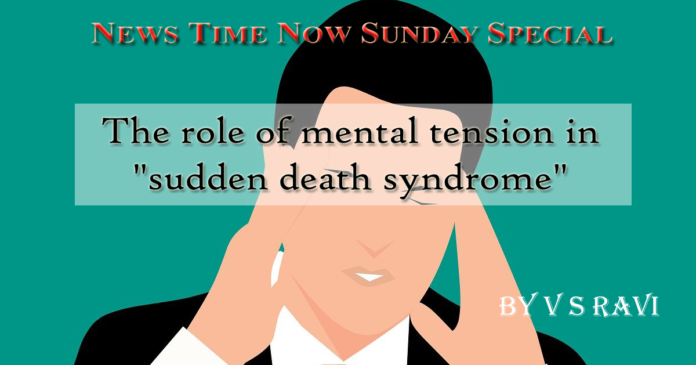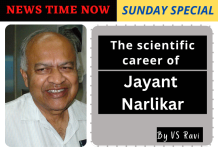For who would lose though full of pain,
This intellectual being,
Those thoughts that wander through eternity,
To perish rather, swallowed up and lost
In the wide womb of uncreated night,
Devoid of sense and motion?
JOHN MILTON
The reluctance to part with life, particularly when it is least expected is one of the most painful experiences on earth. Almost all of us are familiar with the sight of an elderly executive or a businessman, in a movie, clutching his chest in great agony during a vigorous argument, collapsing and then dying. Some of us perhaps cannot resist an amused chuckle questioning as to whether it is really possible for a person to die under such circumstances. Does such an incident really occur or is it only a figment of the film director’s imagination? Research has thrown up evidence to suggest that something similar to the phenomenon indicated above does, in fact, happen in real life. A sudden emotional outburst during a heated argument at home can harm you more than you would have imagined.
It is understood that more than a thousand people die every day(about 365000 every year) in the United States alone from a condition known as ‘sudden death syndrome’—some in fact, expiring within a few minutes of the first appearance of the symptoms. The helpless victim experiences a sudden, drastic, erratic and uncontrollable increase in the rhythm of his heartbeat. This condition quickly deteriorates into the physiological state known as ‘ventricular fibrillation’ during which the heart trembles, jerks and coughs (somewhat like a defective air conditioner or a car engine) instead of pumping blood efficiently as it had been expected to do.
Death due to sudden cardiac arrest or sudden death syndrome results in the death of more persons than any other single disease—every year with men falling victim to such a condition being twice the number of women. This is because women’s hormones seem to protect them from sudden death until menopause after which they are just as much at risk as men.
The wildly erratic heart rhythms or‘ arrhythmia that characterise sudden cardiac arrest are thought to be triggered off by inappropriate electrical impulses from the brain. There is reason to believe that these impulses are activated by stress, a factor that has become all pervasive in human affairs particularly in this age of anxiety.
Doctors have long suspected that stress can be a contributory factor to heart disease. However, it has not been put in the same category as high fat diet, heavy salt intake, smoking, etc., as a high risk factor, partly because many of the data linking stress to fatalities have been anecdotal rather than factual. For example, a study carried out a few years ago on survivors of life-threatening arrhythmias revealed that 21 per cent had experienced acute emotional upset during the 24 hours before the irregular heartbeats had begun. In two-thirds of these cases, the stressful event occurred less than an hour before the attack. One doctor who became the Director of National Centre of Preventive and Stress Medicine in Phoenix, Arizona, and who had been studying the stress-death connection for two decades had been requested by NASA officials in 1968, to find out why 28 to 35 year-old engineers were dropping dead for no apparent reason at all. (This doctor had at that time been a cardiovascular consultant for NASA at Cape Kennedy). Suspicion had been aroused in some circles that these young people were perhaps being poisoned. The doctor’s findings caused considerable surprise. Post-mortem examinations showed that the victims did not have coronary disease. At that time, however, not only had NASA begun a series of sporadic employee layoffs but alcoholism, drug abuse, divorce and suicide rates were also on the increase. This doctor wondered whether there might be a relationship among the sudden death and the loss of identity, loss of control of their lives and lowered self-esteem these young people at Cape Kennedy were suffering from. His first step was to repeat the post-mortem examination of the victims. This time he found part of the answer he had been seeking. Ruptured heart-muscle fibres was found in 90 per cent of the engineers, a significant physiological change.
Ten years of experimentation on animals by the same doctor led to the conclusion that excess amounts of adrenaline had caused the physiological change in the engineers’ hearts. The experiments showed that fear of other types of stresses can trigger the secretion of extra adrenaline which, in turn, increases the heart rate, raises blood pressure and speeds up respiration. Within five minutes of administering large doses of adrenaline to lab animals, it was noticed that chaotic electrical storms began raging in their hearts. Then the hearts started beating in an erratic fashion, stopped pumping blood and finally gave up. The question now arises as to whether shots of adrenaline cause the same response as adrenaline triggered by stress. The doctor’s study failed to establish this. Furthermore, he had not determined whether healthy persons were as much affected as cardiac patients.
However, one researcher at another medical institute in the United States recently conducted studies to find answer to these questions. His experiments with animals proved that psychological factors increase risk of arrhythmia in those whose hearts are already vulnerable. He and his research colleagues administered mild electric shocks preceded by light signals to one group of guinea pigs in order to condition them into anticipating a shock following a light signal. A second group of animals received only the light signal. After a week’s training all the animals were given digitalis, a powerful cardiac stimulator. It is known that while digitalis is commonly used in the treatment of a variety of heart ailments, an overdose can cause dangerous arrhythmias even in healthy people. Digitalis can be used in the lab to create a predisposition to heart problems.
After receiving the digitalis all the animals were given the light signal. The group conditioned to receiving a shock after the signal responded as though it was being subjected to stress although in reality there was no outside stress. According to the doctor such animals developed arrhythmia much more quickly than the group that was not conditioned. This researcher performed another experiment on guinea pigs, wherein shock was administered but digitalis was not. None of the animals developed arrhythmia. This researcher now holds the view that stress is not life-threatening for healthy people. According to him, when you are under stress, your heart may race but it probably won’t threaten your ultimate health, i.e. whether you will live or die. Some other researchers like the doctor who did research at NASA believe that you do not have to be predisposed to heart failure for mental stress to cause sudden death.
Constant spurts of excess adrenaline provoked by stress can eventually produce cardiac disease. Some other researchers also believe that stress and the resulting surge of adrenaline may play a powerful role in triggering cardiac arrest even in seemingly healthy individuals. They point to the flood of chemicals called catecholamines (which include adrenaline) released by the nervous system during periods of extreme stress.They believe that these may rupture tiny cardiac muscle fibres which in turn generate the electrical accidents thought to cause arrhythmia (Some experts remain sceptical about the relationship between stress and sudden death stating that there is not enough evidence to nail down a firm link, but these experts are in a minority.)
Although some doctors feel that the final verdict on stress is not yet in, available data indicate that it may play a more insidious role than previously believed or even suspected. Scientists are hoping to do more sustained and systematic research on the effects of stress to enable them to identify those at risk of sudden death. In fact, scientists have already developed some elaborate and precise testing systems that measure physiological over-reactions to mental stress. These systems are capable of identifying those people described as ‘heat reactors’ who figure as one in every five healthy Americans and who when challenged with simple mental tasks, will over-react as if fighting a leopard or a lion, thus generating a large amount of adrenaline, which is much more than what is needed for the purpose, and hence cause damage to vulnerable cardiac muscle fibres. Modern research is geared to the task of identifying such persons and also to find ways and means to take preventive steps to reduce the incidence of death due to a sudden cardiac arrest, following stress. In the meantime the average person would do well to try to maintain a calm and serene lifestyle characterized by a relaxed attitude that enables him to steer clear of all domestic tensions and office worries which wreak havoc on the nervous system. Such a man not only does not need doctors, he does not also need apples for breakfast!

















































